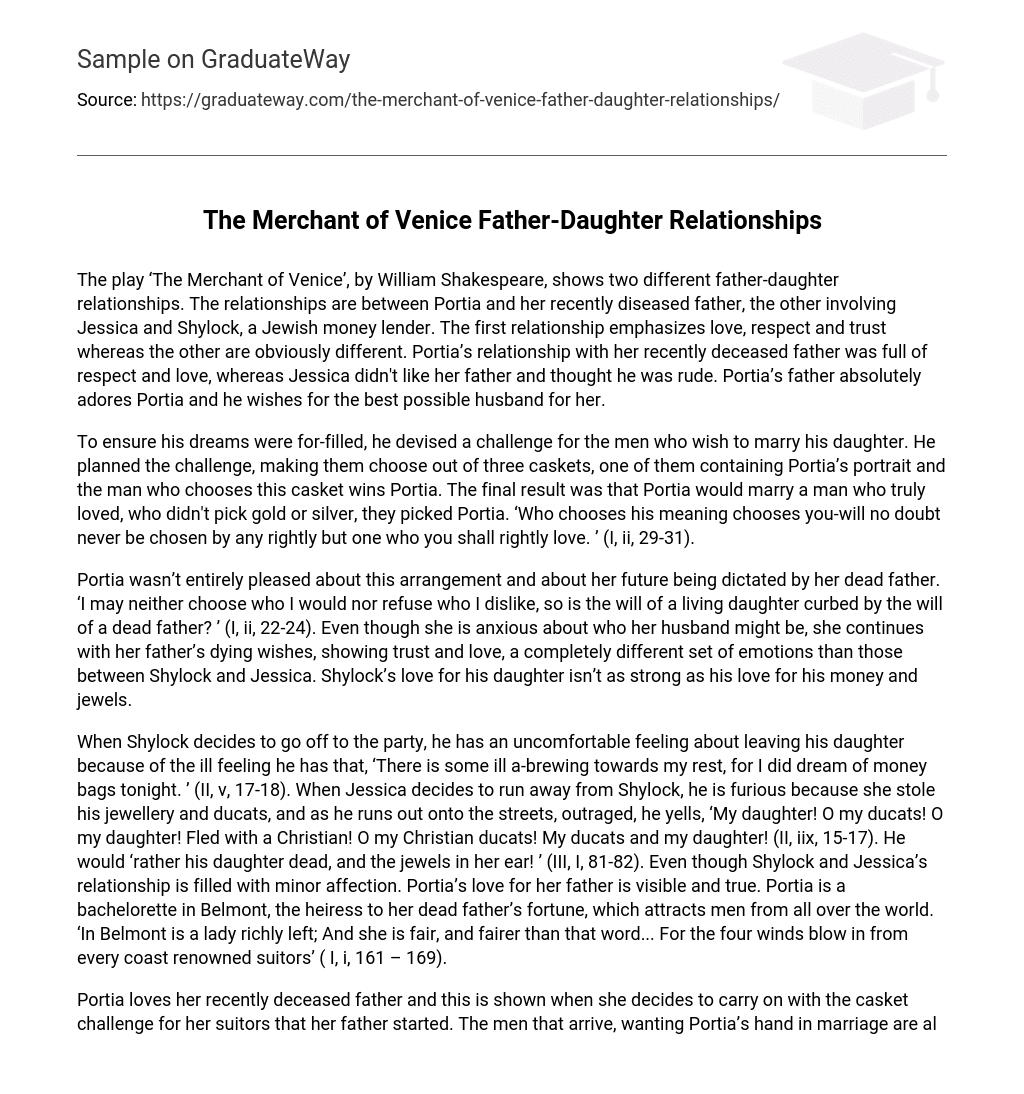The play ‘The Merchant of Venice’, by William Shakespeare, shows two different father-daughter relationships. The relationships are between Portia and her recently diseased father, the other involving Jessica and Shylock, a Jewish money lender. The first relationship emphasizes love, respect and trust whereas the other are obviously different. Portia’s relationship with her recently deceased father was full of respect and love, whereas Jessica didn’t like her father and thought he was rude. Portia’s father absolutely adores Portia and he wishes for the best possible husband for her.
To ensure his dreams were for-filled, he devised a challenge for the men who wish to marry his daughter. He planned the challenge, making them choose out of three caskets, one of them containing Portia’s portrait and the man who chooses this casket wins Portia. The final result was that Portia would marry a man who truly loved, who didn’t pick gold or silver, they picked Portia. ‘Who chooses his meaning chooses you-will no doubt never be chosen by any rightly but one who you shall rightly love. ’ (I, ii, 29-31).
Portia wasn’t entirely pleased about this arrangement and about her future being dictated by her dead father. ‘I may neither choose who I would nor refuse who I dislike, so is the will of a living daughter curbed by the will of a dead father? ’ (I, ii, 22-24). Even though she is anxious about who her husband might be, she continues with her father’s dying wishes, showing trust and love, a completely different set of emotions than those between Shylock and Jessica. Shylock’s love for his daughter isn’t as strong as his love for his money and jewels.
When Shylock decides to go off to the party, he has an uncomfortable feeling about leaving his daughter because of the ill feeling he has that, ‘There is some ill a-brewing towards my rest, for I did dream of money bags tonight. ’ (II, v, 17-18). When Jessica decides to run away from Shylock, he is furious because she stole his jewellery and ducats, and as he runs out onto the streets, outraged, he yells, ‘My daughter! O my ducats! O my daughter! Fled with a Christian! O my Christian ducats! My ducats and my daughter! (II, iix, 15-17). He would ‘rather his daughter dead, and the jewels in her ear! ’ (III, I, 81-82). Even though Shylock and Jessica’s relationship is filled with minor affection. Portia’s love for her father is visible and true. Portia is a bachelorette in Belmont, the heiress to her dead father’s fortune, which attracts men from all over the world. ‘In Belmont is a lady richly left; And she is fair, and fairer than that word… For the four winds blow in from every coast renowned suitors’ ( I, i, 161 – 169).
Portia loves her recently deceased father and this is shown when she decides to carry on with the casket challenge for her suitors that her father started. The men that arrive, wanting Portia’s hand in marriage are all drunk and boisterous and she isn’t particularly attracted to them but she is obliged to, because of her father’s wishes. The way Portia acts towards her father shows how much she loved him, unlike Jessica’s attitude towards her father. Jessica is Shylock’s only daughter.
She leaves her father heart broken when she decides to run off with a Christian, Lorenzo, and steals to her father’s ducats and some family treasures. Jessica is ashamed to be Shylock’s daughter and she absolutely detests living in her father’s house commenting that, ‘What heinous sin it in me to be ashamed to be my father’s child. ’ (II, iv, 16-17). When Jessica gives Lancelot a letter for Lorenzo, she is extremely excited about leaving her father; she dresses up as a page boy and steals her father’s possessions to run away with Lorenzo. If thou keep promise, I shall end this strife; become a Christian and thy loving wife! ’ (II, iv, 20-21). Jessica and Shylock’s relationship is full of hate and that is obvious all through the novel. The father-daughter relationships in the novel are extremely different. Even though fathers love their daughters, Shylock loves his money more, which is noticeable. Portia’s relationship with her deceased father is loving and adorable, where as Shylock’s and Jessica’s relationship is full of embarrassment and hate, so they are reasonably different.





